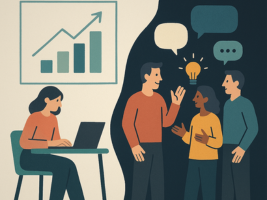THE QUOTE:
“MOOCs and other online instruction is still the old “broadcast model” where everyone gets the same content whether they need it or not. When systems start to provide the content I need differently from the content you need, we will have taken a giant step forward.” – Karl Kapp (in our interview with him)
THE JOURNEY:
We, at Learnnovators, have always been fascinated by the power MOOCs can offer. We have been having this topic as an integral part of our ongoing research activities especially after receiving some great insights fromKarl Kapp (quoted above). Based on our research findings since then, we have been doodling about the limitations of the present-day MOOCs (Designs), and have also been exploring possible ways that could help transform these great tools into more acceptable and effective medium for today’s workforce. Though their pedagogical qualities and effectiveness are being constantly questioned, we have been quite confident that they would evolve into one of the most effective delivery models for education. What is, however, required is that they have to be designed on engaging learning strategies and components that satisfy today’s learners.
Today, while we are in the process of assisting one of our clients in setting up a Corporate University/MOOC for their internal training purposes, we set out on a quick journey to explore and learn more about the recent changes that have been marking this space.
Below are the questions we were eager to get the answers for, when we embarked on our journey:
- How are corporate MOOCs faring today in workplaces around the world? What are the challenges and concerns learners are facing with the traditional MOOC design?
- How are the MOOC designs evolving? Are they witnessing any interesting inventions that could inspire us?
- How will MOOCs evolve further? What will the future MOOCs look like?
OUR FINDINGS:
Data, Analytics and Learning: We’ll start with this free Dual Layer MOOC – called DALMOOC from EdX on ‘Learning Analytics’ designed by a group of experts that includes George Siemens! We also checked out:
- The pedagogical innovations planned on this experiment by George Siemens
- The technological innovations included in its design (by Matt Crosslin)
Below are some of the other interesting resources on this subject that we would like to share with you.
Predictions/Surveys
- Lessons from MOOCs for Corporate Learning (2014): This In-Focus Report (from Towards Maturity) explores different aspects of learning design that can be drawn from MOOCs and applied effectively to learning in the corporate world to support the demands of today’s learners. The report, based on data from over 500 participants worldwide, covers some interesting trends and predictions.
- Deloitte TMT Predictions 2014 Report: This report explores the state of MOOCs in 2014. It also explores reasons why MOOCs haven’t created the needed disruption yet. The video version of the report is available here.
Examples/Success Stories
- Coursera’s MOOCs Go To Work – What MasterCard Is Learning: In this article, George Anders explains how MasterCard is leveraging Coursera’s platform and content, to train its employees and how the company is encouraging them to actively engage in this initiative.
- Better Money Habits: This interesting MOOC was designed by Bank of America in partnership with Khan Academy, for educating its customers on personal finance.
Presentations/Webinars/Videos
- What’s a MOOC – And Where Is It Going Next?: Here’s a Ted article that explores the history of MOOCs, lists the challenges these platforms have been facing, and elaborates on thoughts that support the idea of MOOCs augmenting the traditional higher education model.
- MOOCs for Corporate Learning: This recorded webinar ofJosh Bersin and Todd Tauber discusses the latest trends of MOOCs and the impact they have on corporate training. It also discusses some other interesting ways in which organisations are using MOOCs to drive business results such as recruitment, advertising, customer relations, and collaboration & innovation. In case you are not able to view this webinar, check the presentation available here.
Articles/Posts
- MOOCs, Flipped Classrooms – The Last Gasp of Old Corporate Training?: This post by Jane Hart discusses howMOOCs and Flipped Classrooms are adding another new layer to the old outdated training model at workplaces. It also takes a quick look at emerging models of learning such as social learning, on-demand learning and continuous personal learning that are proving to be more effective.
- 10 Big Reasons for Rise of Corporate MOOCs: This Training Zone post by Donald Clark discusses some interesting opportunities for MOOCs to evolve from a ‘closed’ corporate setup. The post, citing some real-world examples, makes for a valuable read for any L&D practitioner or enthusiast.
- How MOOCs Will Revolutionize Corporate Learning And Development: This Forbes article by Jeanne Meister carries some insights on how MOOCs can provide you the impetus to re-think your employer brand and corporate learning department.
- Comparing xMOOCs and cMOOCs: Philosophy and Practice: This interesting article by Tony Bates examines the differences between the philosophies and practices of xMOOCs and cMOOCs. Though these are more of a personal interpretation based largely on the author’s own experiences as a participant, the views are quite insightful and thought provoking.
- How are Companies Using MOOCs Today?: This article by Sam Herring (of Interprid Learning) carries some of the key themes that emerged from the conversations the author had with business and learning leaders on how they are using MOOCs today, what applications they envision for their diverse audiences, and what ideas they have for using them in the future.
- What’s the Role of MOOCs in the Corporate World?: This brilliant post by Safia Abbasi (of Udemy) explores why corporations are still not very much receptive to the idea of adopting MOOCs. It also explains why corporate leaders should acquire a taste for MOOCs, by citing numerous benefits they could bring in.
- From Micro-Learning to Corporate MOOCs: In this post, Sahana Chattopadhyay discusses her thoughts on how micro-learning and learning-flows could map to MOOCs.
- MOOCs and Performance Support: This ‘Your Training Edge’ article by Bryan Nelson (Managing Director of CapitalWave Inc.) presents another interesting thought on how corporates can effectively make use of MOOCs in delivering embedded performance support in their training programs.
Infographics
- MOOCs: This well-designed infographic by Alex Cusack of Moocs.com neatly summarizes the MOOC story in a highly intuitive style.
Courses & Events
- MOOC on Corporate MOOCs: A MOOC from Intrepid Learning offers a first look at the Corporate MOOC solution. Participants will learn about the value of corporate MOOCs insolving today’s most pressing business challenges. This collaborative learning experience also features some of the most effective learning techniques including gamification.
- Learning 2014: Elliot Masie is hosting a MOOCs & Corporate Learning Symposium at Learning 2014 – to be held in Orlando, Florida from Oct 26 to 29. The key speakers of this event include Sir Ken Robinson who will also be interviewed by Elliott Masie on the topic ‘The Learning Revolution’.
OUR LEARNINGS:
As we came to the end of our search, we had the following learnings as ‘take-aways’ from our little journey:
- It is exciting to see how corporate MOOCs are transforming from the traditional rigid and not-so-learner-friendly model to new avatars that could help manage all facets of workplace learning including formal, informal and social learning.
- We believe that MOOCs are set to transform education and learning with each and every company (big and small) having its own MOOC strategy. We foresee the future of learning delivery as well as business communications being driven entirely through the cloud with MOOCs playing a very significant role. However, for this to happen, it is imperative for us to:
- Constantly learn from our own experiences with the traditional designs
- Get inspired by challenges that users haven been facing and look at innovative ways to address these
- Use the power of emerging technologies to satisfy the changing needs and styles of users (employees, partners, customers and prospects)
What are your thoughts on the challenges arising out of the traditional MOOC designs? How do you think these are evolving? Do you have any interesting experiences with MOOCs that you would like to share? How do you think will the future MOOCs look like?
We would love to hear from you.
Written by Santhosh Kumar
_________________________________
Published on 18-Oct-2014






